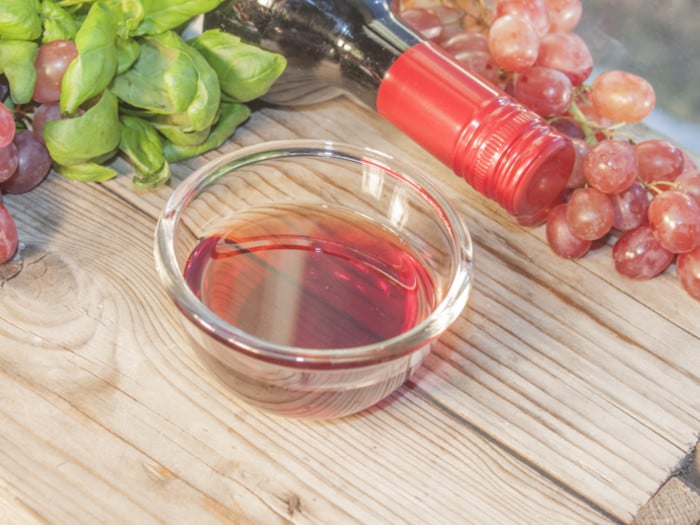If you ever need a red wine vinegar substitute, there are a few excellent options to choose from, some of which you may already have on hand.
What is Red Wine Vinegar?
Red wine vinegar is a type of vinegar made from red wine, once the alcohol has further fermented into vinegar. As a result, red wine vinegar has only trace amounts of alcohol, as compared to its source. It is popularly included in culinary applications, as it has a strong acidic quality that can sharpen flavors, while also helping to tenderize meat. [1]
Widely available around the world, this popular form of vinegar is an important ingredient to have on hand, but if you run out, there are plenty of other options to use.
Red Wine Vinegar Substitutes
The best red wine vinegar substitutes include lemon juice, tamarind paste, apple cider vinegar, balsamic vinegar, and red wine, among others.

If you don’t have red wine vinegar on hand, try using lemon juice instead. Photo Credit: Shutterstock
Red Wine
Using red wine will not bring as much acidity to your dish, but the rich flavors of red wine can mimic the effect of red wine vinegar. It is also the same color and consistency of red wine vinegar, making it one of the most popular substitutes.
Lime/Lemon Juice
If you are only using a small amount of red wine vinegar in a recipe, switching it out for lemon or lime juice can provide strong acidity to your recipe but you don’t need to use as much since this juice is more potent than vinegar.
Apple Cider Vinegar
Although this substitute is more commonly used with white wine vinegar, apple cider vinegar can certainly provide the acidity you want in your meals to tenderize the meat and add that sharp, desirable flavor. [2]
White Vinegar and Red Wine
If you want to match color and flavor, as well as acidity, your best bet is to blend red wine and white vinegar, but be careful about the proportions, as it could easily overpower the rest of the dish.
Tamarind Paste
One of the more unusual red wine vinegar substitutes is tamarind paste, which can help to tenderize meat, but it must be used in limited quantities, as the flavor is quite strong and can affect the overall dish very easily. [3]
Balsamic Vinegar
Perhaps the most common vinegar in most kitchens, this flavorful and aromatic vinegar variety is barely discernible from red wine vinegar in most recipes. [4]
Word of Caution: Cooking with alcoholic beverages results in only some loss of alcohol content. Foods baked or simmered in alcohol can retain anywhere from 4 percent to 85 percent of the alcohol, according to a study by the U.S. Department of Agriculture’s Nutrient Data lab. Also, if you are following a total avoidance of alcohol, you may want to skip using different kinds of wine vinegar as they do still contain some level of alcohol. [5]
